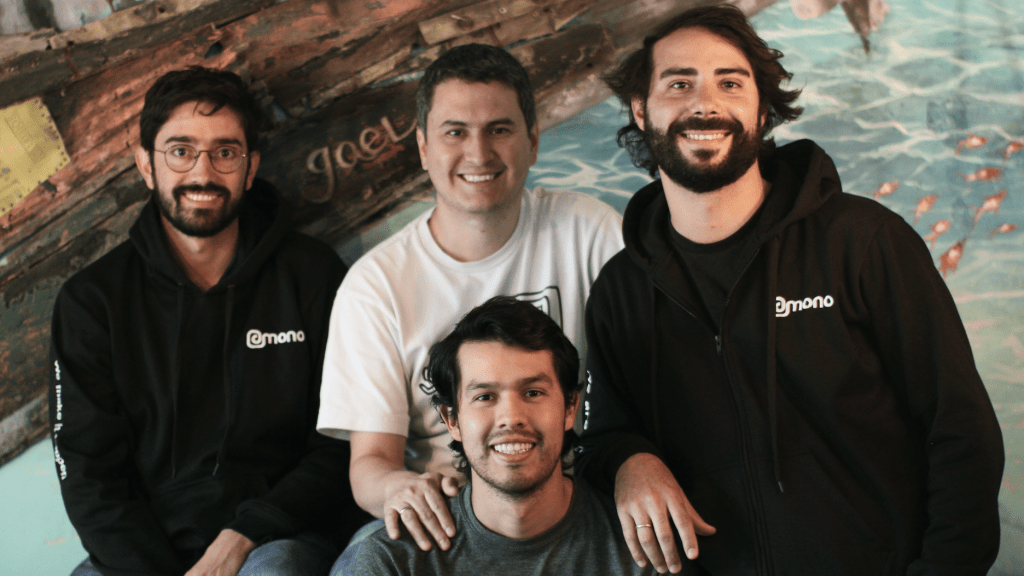Opening a business bank account should be fairly easy, but after seeing firsthand just how hard it was, Salomon Zarruk and Sebastian Ortiz decided they didn’t want another Latin American business to run into the same kind of difficulty.
The pair, who worked together at Tpaga in Colombia, relocated to Mexico a few years ago to launch the mobile wallet company there, and let’s just say, Zarruk was less than impressed with the experience. In fact, he told TechCrunch that opening a bank account for the company “was a mess.”
What they came up with was Mono, which means “monkey” in Spanish, a fintech company that provides corporate or business accounts for startups in Colombia. Zarruk and Ortiz, along with Juan Camilo Poveda and José Tomás Lobo, started Mono in January while going through Y Combinator.
Like Zarruk and Ortiz, Poveda has banking experience, having previously developed lending and banking products for Nubank. Meanwhile, Lobo has a tech operations and execution background.
The company’s name is inspired from what happens after there is a fire in the forest, Lobo explained. Though the whole land is black and filled with ashes, it is still fertile, and when the monkeys start going from tree-to-tree eating seeds, they drop many of the seeds on the ground, which become new growth.

“Those seeds thrown make the rebirth of the forest, and we like that analogy because that’s what small businesses do for the economy — entrepreneurs come in and make changes to the economy,” he added.
Zarruk called Mono “the first bankingless bank” for startups and small businesses in Latin America, providing financial services and fully digital bank accounts that can be opened in around 15 minutes versus an average of two weeks at an incumbent bank.
He explained that the fintech can be labeled “the first” because he believes the company is the first to build a bank for entrepreneurs in Latin America, what he defined as an autopilot bank, that automates several accounting services that are highly manual today. In fact, when Mono tried to establish a bank account at one of the big banks in Colombia, after filling out the paperwork, it still didn’t have an account after two months, Zarruk added.
The bank account perspective is also where he claims Mono separates itself from competitors that are instead approaching business accounts with credit cards, payment terminals or cash management products.
Mono operates with a local banking partner in Colombia and is building its own tech stack. It currently offers bank accounts with physical and virtual debit cards, the ability to make and receive wire transfers and make payments.
“Speed is our motivation because we want to help small businesses compete with incumbents,” Zarruk said.
Much of the company’s growth has been organic. By March, Mono had attracted more than 300 customers and achieved $1 million in total payment volume. Its workforce has grown to 25 employees, and the company expects to round out its senior leadership within the next year.
To keep that momentum going, the company announced $6 million in seed funding led by Tiger Global (interestingly enough, Tiger also backs an African fintech, also named Mono). Also participating in the round were Soma Capital and Y Combinator. Mono has a whole squad of angel investors, but highlights for this round, Monzo founder Tom Blomfield, Jamie Devlin from Revolut and founders of Fintual and Belvo.
The new funds will enable Mono to plan for future expansion to other countries, like Mexico, Peru, Chile and Brazil.
“We estimate that we have around 24 months of runway, and the most important thing right now is product development,” Zarruk said. “We are building a strong tech stack to integrate with third parties so that we can begin to offer several accounting features, like taxes, accounts receivable and payable processes that are currently difficult to do.”
A wave of LatAm fintechs are laying down new global commerce rails































Comment